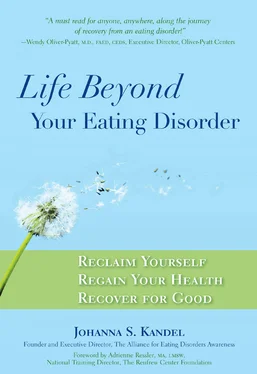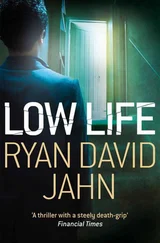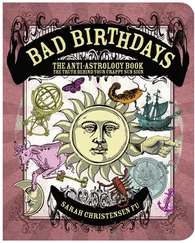If I were given a second chance in this journey called life, I would help others battle eating disorders so they wouldn’t travel down the same path I did.
By then I was nineteen years old and really, as the saying goes, sick and tired of being sick and tired. Both my parents and my doctors had speculated that if they took ballet out of the equation, my eating disorder might just go away, and I actually thought so, too. After all, I really believed that the whole thing had started because I wanted to lose weight in order to be a more beautiful dancer. And I even remembered that when I was in high school, I’d look at the kids who were music students and think, Wow, if I were a musician instead of a dancer, I could eat anything I want. I don’t believe it anymore, but at the time the idea that my dancing had caused my eating disorder seemed pretty logical to me.
I resigned from the company and thought that my eating disorder would go away immediately. Boy, was I wrong. In truth, dancing was the only thing that had been keeping me alive. Aside from my eating disorder, it felt like my only identity. Now I didn’t know who I was. My only remaining sense of identity came from my eating disorder. I had, in essence, become my eating disorder.
I was alone in Orlando with nothing to do, and I was floundering. I’d never intended to go to college, and I’d never considered what I might do with my life if I wasn’t dancing. I started to binge more and more, because I thought that was the only way I had to relieve the pain I felt. If you’ve binged yourself, you know that it has nothing to do with enjoying the taste of the food you’re eating. Actually, in the moment, you don’t taste anything at all. It’s all about stuffing down (or numbing) and running away from any kind of feeling or sensation. After I binged, I felt awful and guilty about what I had just done. When I was restricting, I felt good about myself because I felt that I was in control. When I binged, I felt an enormous loss of control.
I called my parents and, for the first time, admitted to them that I really needed and wanted help.
I remember waking up at two o’clock one morning and realizing that I had no sense of who or what I was. My parents had been urging me to go back to school, and I decided to enroll in a psychology course at the local community college, thinking that I might gain some insight into what was going on in my own mind. It was while I was taking that course that I made another decision: if I were given a second chance in this journey called life, I would help others battle eating disorders so they wouldn’t travel down the same path I did. Since all I knew besides ballet was my eating disorder, I determined that I would become a therapist specializing in eating disorders. After sticking my toe into academic waters, I went back to college full-time, entering the University of Central Florida in January 1998 and, in true perfectionist style, starting to follow an absolutely ridiculous, stressful schedule. (I actually graduated college in two and a half years…which is definitely not a healthy thing to do.)
I really had nothing in my life to focus on except school, and being focused on school became another way to numb my feelings. So that was where I transferred my obsession, taking more than the required number of classes. Given that I was in a cycle of restricting during the day and then, when classes were over, going back to my apartment and bingeing, my career choice was at the time somewhat ironic and, in retrospect, unrealistic. By that point I was wearing plus-size clothing, and to say that I was not a healthy girl (mind, body and spirit) would be the understatement of the century. But I knew that if and when I got better, this was what I wanted to do with my life.
In pursuit of my newfound career objective, I called a few local practitioners who specialized in eating disorders and asked whether I could become an intern or shadow them in their practice. They all told me that because of confidentiality issues, they couldn’t allow me to do that, but one of them also told me about the International Association of Eating Disorders Professionals (IAEDP), an eating disorders organization that had just relocated to Orlando and was looking for volunteers. I called the executive director, Dr. Marie Shafe, who asked me to come in for an interview. She turned out to be one of the most amazing and inspiring people I’ve ever met in my life, and she urged me to volunteer. Before long, I progressed from volunteering to a paid position. I started to help out in the office, working on the newsletter and working alongside the director as her assistant. By that time it was the year 2000. I was in college, applying to graduate schools and working when I realized I was actually falling apart at the seams. I was realistic enough to know, after taking so many psychology courses, that I couldn’t go to graduate school and learn to help other people until I’d helped myself. I called my parents, told them that I was putting graduate school on hold and, for the first time, admitted to them that I really needed and wanted help. I’d also confided in Dr. Shafe, and she helped me get into an outpatient treatment program.
Over the years I’d been to see many different therapists on several occasions, but until then I’d always told the therapist exactly what I knew he or she wanted to hear, and that was it. I simply wasn’t ready to hear what the therapist had to say to me. I wasn’t ready and willing to see a life without my eating disorder. I’d go to a nutritionist, take the meal plan I was given and throw it in the nearest trash can before I even got home. In other words, I manipulated everyone and sabotaged myself in order to maintain my eating disorder, which felt safe to me. The thought of giving up the eating disorder and going into an unknown place was much more frightening than maintaining the familiar, miserable as it was, and suffering the consequences.
I was still thinking in black-and-white, all or nothing. I was going to do recovery the same way I’d approached anorexia, wholly and completely. I slipped, as we all do, and boy, did I ever beat myself up.
But this was different. Now I had a nutritionist, a therapist and an entire treatment team, and I was truly ready to take back my life and get better. For the first time in my life I began to understand the feelings that underlay my eating disorder: why I hated myself so much, why I felt so undeserving, why I felt that everything had to be perfect. At first it was very scary to feel again after avoiding those feelings for so long. I didn’t like it one bit, but once I began to understand that I didn’t need to be perfect, that recovery wasn’t going to be perfect, I started to breathe again. It wasn’t easy, and I could not have done it if I hadn’t already come to the realization that I wanted to get better and was ready to do whatever was necessary for me to get healthy. Up to that point, I honestly hadn’t been willing; I just didn’t want to. No one—including me—could love me enough for me to be encouraged to get better. I’d devoted ten years of my life to my eating disorder, and now, for the first time, I wanted to live, laugh and feel good about myself again. I even wanted to go on a date. At the time, I hated my body so much that I was literally avoiding any kind of contact at all with the opposite sex. Instead of checking out the guys, I spent my time sizing up other women and comparing them to myself—and, not surprising, I was always the one who came up short. I felt as if someone had taken away my soul, and now I wanted it back.
Never once in my entire life had I awakened in the morning, looked out the window in sunny West Palm Beach and said, “Today I’m going to become an anorexic.”
I started to get better, but things didn’t immediately become all better. In fact, my recovery process was far from easy, predictable or perfect. That was yet another hugely important realization for me. Initially, I was still thinking in black-and-white, all or nothing. I was going to do recovery the same way I’d approached anorexia, wholly and completely. I’d decided to get better and, therefore, I would be completely better immediately. I would be the Queen of Recovery—at least that was what I thought. Of course, it didn’t happen that way; it simply isn’t possible. I slipped, as we all do, and binged—and boy, did I ever beat myself up afterward. As was typical for me, I used my slipup as an excuse to keep telling myself that obviously I wasn’t good enough to do even recovery correctly.
Читать дальше












